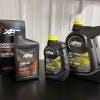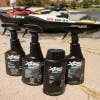Powersports engines are operated in some of the most demanding conditions on the planet and often at or near maximum power output levels. In order for your engine to provide maximum enjoyment, it’s important to use engine oil with a high resistance to breaking down over its useful life. This is why a shear stable oil is critical to ensure your engine oil is properly protected against permanent viscosity lost due to shear.
Shear stability should be one of the factors you look at when evaluating oil for your powersports vehicle. “Shear” is described as an engine oil’s permanent loss of viscosity. This happens when the long chain polymers that maintain an oil’s viscosity at engine operating temps are broken. Shear stability is an oil’s resistance to that viscosity loss. When an oil has broken its long chain polymers and has a thinner viscosity, typical consequences are accelerated internal engine wear and higher oil consumption.
Looking at the detailed chemistry of oils, you’ll learn most multi-viscosity oils use long chain polymers as viscosity improvers to maintain a thicker lubricating film as the oil heats to operating temperatures inside the engine. Using a 10W-40 engine oil as an example, the oil is classified as a 10-weight in a standardized viscosity rating system and flows easily when the engine is cold to provide critical, cold-engine start protection. That same oil will have a 40-weight viscosity index at 100 degrees C in a rating system (at warm engine operating conditions).
Over time, these long-chain polymers break and cause permanent viscosity loss. This means your oil will still be a 10-weight in its cold state, but once warm it becomes thinner and at risk of not providing the specified protection of a 40-weight viscosity oil. Without that proper protection, you risk critical damage to your engine components.
How engine oil molecules and polymers react to shear
Because oils are complex chemistries and it’s difficult to find two oil blends that are truly identical to one another, oils react differently under the same conditions – when it comes to shear and shear stability standardized testing, base oil(s), viscosity improvers and a long list of other additives can affect shear resistance.
Not all viscosity improvers are the same, either. A typical long chain polymer shape is like a coiled spring that is easily cut, resulting in shear. XPS engine oils use a more complex polymer that is more spherical in shape and has a lower molecular weight, making it more robust and giving it higher shear stability performance.









